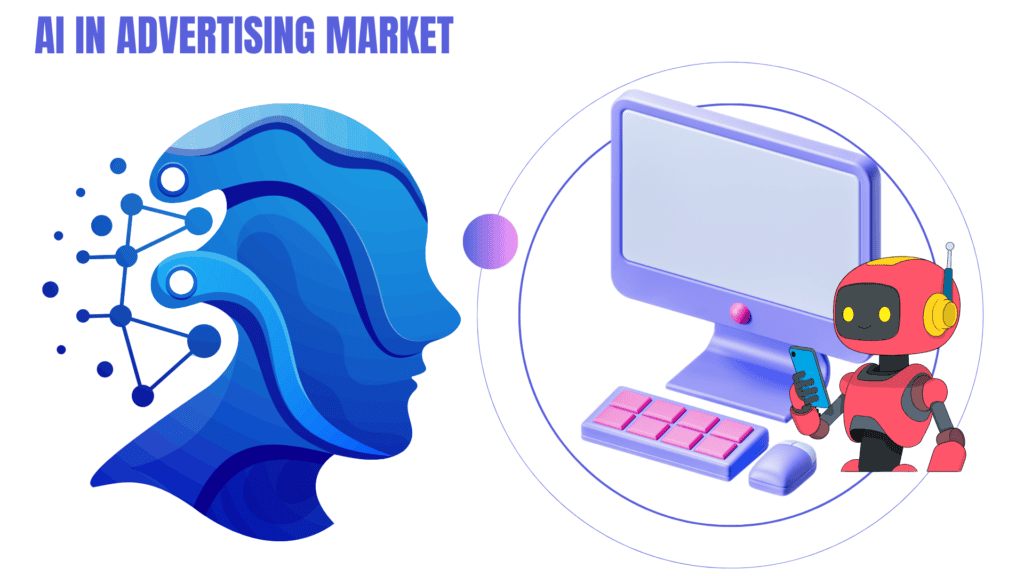AI in Advertising Market Size
The global AI in advertising market was valued at USD 8.6 billion in 2024 and is expected to grow at a 28.4% CAGR. It is estimated to reach about USD 81.6 billion by 2033, reflecting strong adoption of AI tools across digital advertising channels.
The AI in advertising market has expanded as brands and agencies adopt intelligent systems to optimise campaigns, personalise messaging and improve audience targeting. Growth reflects the rapid shift toward data driven marketing, rising digital ad volumes and the need for faster decision making across advertising channels. AI systems are now used across creative design, media buying, customer insights and campaign optimisation.
The main drivers boosting AI adoption in advertising include the need for precise audience targeting, rising digital content consumption, and demand for automation to improve efficiency. About 60% of digital ad spending is influenced by AI, helping marketers reduce waste and increase campaign effectiveness by around 45%. AI also enhances real-time decision-making and dynamic ad content creation, which makes campaigns more responsive to consumer changes.

Key Takeaways
- The global market for AI in advertising is expected to rise to USD 28.4 billion by 2033, supported by a strong 28.4% CAGR, after being valued at USD 6.7 billion in 2023. Growth has been driven by increasing automation, demand for personalization, and data-driven ad strategies across digital platforms.
- In 2023, the software segment accounted for the largest share at 69.5%, as advertisers relied heavily on AI platforms for optimization, analytics, and creative automation. Targeted advertising remained the leading application with 31.1%, reflecting the strong adoption of AI tools for audience segmentation, predictive modeling, and dynamic content delivery.
- The retail and e-commerce sector held the highest end-user share at 26.4%, driven by rapid digital transformation, high competition for customer attention, and the need for real-time ad personalization to support online sales
Driver Analysis
AI enables advertisers to analyze massive data sets in real-time to understand customer preferences and behavior deeply. This ability allows for highly precise audience targeting, boosting engagement and conversion rates. As digital channels expand rapidly, marketers need efficient ways to manage campaigns, optimize ad placement, and automate repetitive tasks, making AI-driven automation an essential growth driver. AI tools also continuously learn and adapt, enhancing campaign performance over time with less manual effort, increasing return on investment for advertisers.
The increasing complexity and fragmentation of audiences across platforms demand scalable AI solutions. These systems can handle diverse customer segments and deliver personalized ads effectively at scale, driving further adoption in industries like retail and e-commerce where personalized marketing significantly impacts sales. AI’s integration with advances in predictive analytics and deep learning keeps evolving its capabilities, sustaining strong market growth momentum.
Restraint Analysis
Despite its benefits, AI adoption in advertising faces significant privacy and security concerns. AI relies heavily on collecting and processing large volumes of user data, raising risks around data misuse and customer consent. Strict regulations, such as GDPR in Europe and similar laws elsewhere, limit how personal data can be gathered and used, restricting AI’s operational scope.
Additionally, the technical complexity of AI algorithms creates challenges in transparency and accountability, making it harder for companies to explain how decisions are made. This lack of transparency can erode consumer trust and invite regulatory scrutiny. Advertisers must navigate these legal and ethical constraints carefully to avoid penalties and backlash, slowing the speed of AI adoption.
Opportunity Analysis
AI presents a strong opportunity through hyper-personalization of advertising content. By analyzing detailed behavioral data patterns, AI can tailor messages that resonate closely with individual consumers’ tastes and buying habits. This relevance improves customer engagement, increases conversion rates, and fosters brand loyalty.
The automation AI offers also frees marketers from tedious tasks, allowing more focus on strategy and creative work. Real-time data processing enables quick adjustment to market changes and consumer trends, maximizing ad effectiveness and budget efficiency. Emerging AI applications like conversational interfaces and dynamic ad optimization open further avenues to enhance user experience and business growth.
Challenge Analysis
One key challenge in AI advertising is overcoming the high costs and complexity of deploying advanced AI solutions. Smaller and mid-sized advertisers often lack the financial resources and technical expertise to implement AI tools effectively, which leads to a divide in the market.
Moreover, personalization at scale requires robust data infrastructure and continual data quality maintenance, which can be demanding.
Technical hurdles also include avoiding AI biases that could skew advertising outcomes unfairly. Without careful management, AI-driven campaigns might unintentionally reinforce stereotypes or exclude certain groups. These challenges require consistent investment and oversight to ensure AI benefits are realized ethically and effectively.
Future Outlook
- Hyper-personalized ads based on real-time consumer context.
- Deeper integration of AI with AR/VR for immersive brand experiences.
- Advanced predictive analytics for precise budget optimization.
- Expansion of AI-automated creative development and testing.
- Growth in AI-powered conversational marketing tools like chatbots.
- More sophisticated AI models for cross-channel campaign management.
- Development of AI-driven platforms offering turnkey advertising solutions.
Key Market Segments
Component
- Software
- Services
Application
- Targeted Advertising
- Content Creation and Optimization
- Ad Campaign Management
- Performance Analytics
- Other Applications
End-Use Industry
- Retail & E-commerce
- BFSI
- Media and Entertainment
- IT & Telecommunications
- Healthcare
- Other End-Use Industries
Top Key Players in the Market
- Google LLC
- Meta Platforms, Inc.
- com, Inc.
- Adobe Inc.
- Criteo S.A.
- AiAdvertising, Inc.
- Quantcast
- Taboola
- Outbrain
- The Trade Desk, Inc.
- PubMatic, Inc.
- Other Key Players
Read More – https://market.us/report/ai-in-advertising-market/












